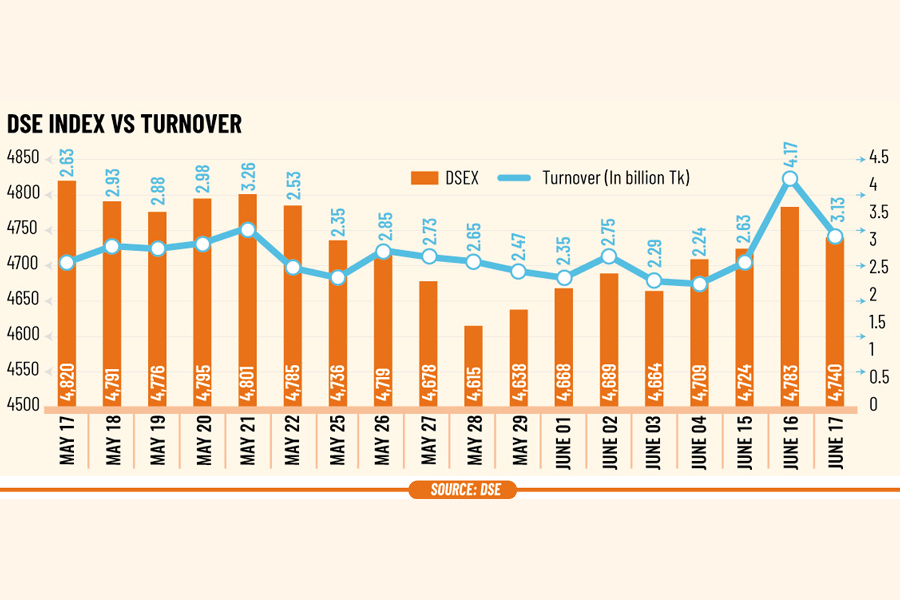
Published :
Updated :

Stocks tumbled on Tuesday in the face of huge selling pressure as investors were rattled by yet another global crisis -- Iran-Israel conflict that seems to last long to affect local businesses.
Tension could drive up the cost of doing business, as the conflict between Iran and Israel entered its fifth day, raising the risk of further regional unrest and prompting investors to shun risky assets, market analysts said.
"If the conflict continues, cost-push inflationary pressure will impact the country's overall economy," said Akramul Alam, head of research at Royal Capital.
He, however, said that although the ongoing conflict engendered some concerns, investors should not be panicked, especially because the market had already hit the bottom.
Aerial attacks between Israel and Iran intensified on Tuesday as the latter retaliated after Israel's surprise attack on Friday at the heart of Iran's nuclear programme, killing several nuclear scientists as well as high-ranking military leaders.
Bangladesh businesses have already expressed concerns, saying the ongoing Middle East conflict may pose fresh challenges.
The conflict has created ripples across the globe, affecting economies far removed from the battle zones. Bangladesh is no exception.
The most immediate concern is a rise in oil prices. Bangladesh, which imports most of its crude oil from the Gulf States, is especially vulnerable. Higher fuel prices feed directly into production costs across the economy, from manufacturing to agriculture.
Terrified by the possibilities, investors were looking to sell holdings and take a safe refuge, leaving the market indices to face a plunge.
The DSEX, the prime index of the Dhaka Stock Exchange, fell 44 points or 0.92 per cent to 4,740, after recovering 119 points in the past three sessions.
Although global stocks plunged since Friday due to the Israel-Iran conflict, the Bangladesh stock market somehow managed to stay afloat over the past three sessions, riding on an improvement on the local political front; the interim government recently announced a roadmap for the next general elections.
The recovery mode failed to sustain as escalating geopolitical tensions surrounding the Iran-Israel conflict showed no signs of ceasefire, which prompted investors to sell-off shares to avoid further erosion, said EBL Securities.
While oil prices rise amid instability in the Middle East and key sea routes, such as the Suez Canal and Strait of Hormuz, become insecure, Bangladesh is confronted with multiple economic stresses.
On condition of anonymity, a leading broker said most investors were in a selling mood as they feared another global crisis.
"The Russia-Ukraine war badly impacted the local economy as well as the stock market. So, investors are worried that another war may further deteriorate the situation," he said.
Price fall of selective blue chip stocks -- Beacon Pharma, BAT Bangladesh, Beximco Pharma, United Commercial Bank, BRAC Bank, and Olympic Industries -- dragged the market down. They jointly accounted for a 10-point plunge of the key index.
As many as 24 blue chip stocks plunged out of 30.
Subsequently, the blue-chip index, a group of 30 prominent companies, dropped 17 points to 1,770 while the DSES Index, which represents Shariah-based companies, declined by 12 points to 1,034.
Investor participation remained low as the total turnover came down to Tk 3.13 billion, which was 25 per cent lower than the previous session's turnover.
Investors were mostly active in the food sector, which accounted for 17 per cent of Tuesday's turnover, followed by the pharmaceuticals sector (13 per cent) and banking sector (12 per cent).
Investors dumped shares of non-bank financial institutions, food & allied, telecom, banking and engineering sector stocks, exerting pressure on the indices.
Losers took a strong lead over the gainers as out of 397 issues traded, 276 declined, 67 managed to close higher and 54 issues remained unchanged on the DSE trading floor.
Lovello Ice-cream was the most-traded stock, with shares worth Tk 206 million changing hands, followed by Beacon Pharma, Agni Systems, Baraka Patenga Power, and BRAC Bank.
Central Insurance was the day's best performer, posting a gain of 9.89 per cent, while Union Capital was the worst loser, shedding 7 per cent.
The port city bourse, Chittagong Stock Exchange, however, managed to close in the green zone with its CSE All Share Price Index -- CASPI -- gaining 0.09 point to settle at 13,245 and the Selective Categories Index -- CSCX -- advancing 4 points to 8,089.
babulfexpress@gmail.com


 For all latest news, follow The Financial Express Google News channel.
For all latest news, follow The Financial Express Google News channel.